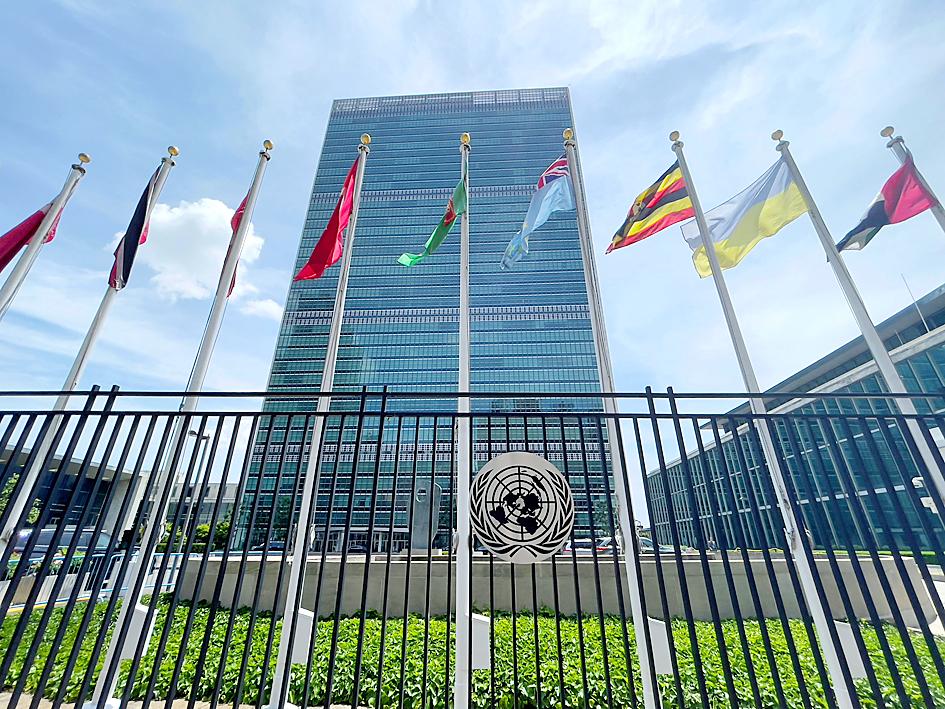Two members of the US House of Representatives on Thursday urged the US government to support UN membership for Taiwan.
In a letter addressed to US Ambassador to the UN Linda Thomas-Greenfield, Republican Representatives Scott Perry and Tom Tiffany called on the ambassador to “use the voice, vote, and influence of the United States to secure Taiwan’s ascension.”
Tiffany posted the letter on Twitter ahead of the UN General Assembly, which is to take place from Tuesday next week to Sept. 21 in New York, with the option of virtual participation over COVID-19 concerns.

Photo: AFP
The US administration should “ensure that Taiwan is fully invested with the rights, privileges, and responsibilities as a UN member state,” the letter said.
The lawmakers also asked the ambassador to detail in a response how Washington plans to assist Taiwan’s inclusion as a UN member state.
Taiwan’s inclusion in the UN would be “a victory for democracy and the rules-based international order,” the lawmakers said.
“It is beyond the pale that we allow our fear of the People’s Republic of China [PRC] to dictate our foreign policy and allow the UN body — dominated by the influence of the Chinese Communist Party — to repeatedly reject Taiwan’s requests to formally join the UN,” the letter said.
“No cogent or logical argument can be made for Taiwan’s 50-year exclusion from the UN,” it said, adding that Taiwan ranks near the top 20 economies in the world, and is the 10th-largest trading partner of the US.
Taiwan, as the Republic of China, left the UN in 1971, when the PRC took its place, and has since been excluded from its special agencies.
Taiwan has over the years campaigned for its participation in the activities, mechanisms and meetings of the UN.
As part of this year’s efforts, the government would again ask diplomatic allies to voice support for the nation’s inclusion in the UN, either by speaking up during the General Assembly or by sending letters to UN Secretary-General Antonio Guterres, the Ministry of Foreign Affairs said.

Chinese spouse and influencer Guan Guan’s (關關) residency permit has been revoked for repeatedly posting pro-China videos that threaten national security, the National Immigration Agency confirmed today. Guan Guan has said many controversial statements in her videos posted to Douyin (抖音), including “the red flag will soon be painted all over Taiwan” and “Taiwan is an inseparable part of China,” and expressing hope for expedited reunification. The agency last year received multiple reports alleging that Guan Guan had advocated for armed reunification. After verifying the reports, the agency last month issued a notice requiring her to appear and explain her actions. Guan

GIVE AND TAKE: Blood demand continues to rise each year, while fewer young donors are available due to the nation’s falling birthrate, a doctor said Blood donors can redeem points earned from donations to obtain limited edition Formosan black bear travel mugs, the Kaohsiung Blood Center said yesterday, as it announced a goal of stocking 20,000 units of blood prior to the Lunar New Year. The last month of the lunar year is National Blood Donation Month, when local centers seek to stockpile blood for use during the Lunar New Year holiday. The blood demand in southern Taiwan — including Tainan and Kaohsiung, as well as Chiayi, Pingtung, Penghu and Taitung counties — is about 2,000 units per day, the center said. The donation campaign aims to boost

The Kaohsiung Tourism Bureau audited six hotels in an effort to prevent price gouging ahead of Korean band BTS’ concert tour in the city scheduled for Nov. 19, 21 and 22 this year. The bureau on Friday said that the audits — conducted in response to allegations of unfair pricing posted on social media — found no wrongdoing. These establishments included the local branches of Chateau de Chine, Hotel Nikko, My Humble House, and Grand Hai Lai, it said, adding that the Consumer Protection Commission would have penalized price gougers had the accusations been substantiated. The bureau said the Tourism Development Act

The Central Weather Administration (CWA) said a magnitude 4.9 earthquake that struck off the coast of eastern Taiwan yesterday was an independent event and part of a stress-adjustment process. The earthquake occurred at 4:47pm, with its epicenter at sea about 45.4km south of Yilan County Hall at a depth of 5.9km, the CWA said. The quake's intensity, which gauges the actual effects of a temblor, was highest in several townships in Yilan and neighboring Hualien County, where it measured 4 on Taiwan's seven-tier intensity scale, the CWA said. Lin Po-yu (林柏佑), a division chief at the CWA's Seismological Center, told a news conference